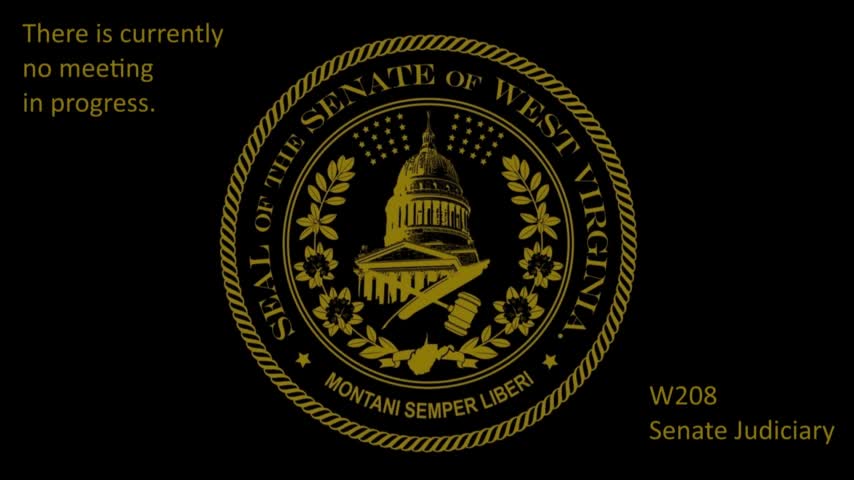Senate committee advances bill requiring studies for new bottled‑water plants in karst areas
Get AI-powered insights, summaries, and transcripts
Subscribe
Summary
A West Virginia Senate committee voted to report originating bill No. 1 to the full Senate after hearing testimony on a proposal that would require new bottled‑water facilities in karst terrain to submit hydrogeologic studies and undergo quarterly monitoring by the Department of Environmental Protection.
The Senate Government Organization Committee voted to report originating bill No. 1 to the full Senate after hearing more than two hours of testimony on a bill that would add pre‑approval study and quarterly monitoring requirements for new bottled‑water operations in karst areas.
The bill would require any commercial operator defined as a "large quantity" user that intends to bottle groundwater in a designated karst area to prepare a hydrogeologic study and submit it to the West Virginia Department of Environmental Protection for approval; the agency would have 60 days to act on the study, and, under the bill, could require reductions in withdrawals if monitoring showed a negative effect on existing users.
Supporters and opponents framed the bill as addressing competing priorities: the company proposing a major bottled‑water plant in Jefferson County described large private investment and job creation, while nearby residents and some lawmakers stressed the sensitivity of karst aquifers and the potential for private withdrawals to affect wells, springs and farms.
Bob McCluskey, an attorney with Jackson Kelly representing the project proponent, told the committee the measure would create legal uncertainty and delay for the project. "It will cause delay for this project that could be fatal to getting financing," McCluskey said, arguing the amendment would change the state's common‑law approach to water use and invite litigation and permit challenges.
A company representative, who identified himself as the project president (name not provided in committee testimony), told senators his group has invested about $20 million so far and expects total capital costs of roughly $150 million to $175 million to build the plant. He said the plan would produce about 70 to 80 permanent jobs and roughly 800 construction jobs, and that the firm had already completed hydrogeologic work it estimates to be two to three years old and costing in the neighborhood of $500,000.
Sean Masterson, representing Sidewinder Enterprises, said the project would offer 50,000 gallons per day to the Charlestown utility board and build a treatment plant to serve the community. "We did offer 950,000 gallons a day, is what we would actually withdraw," Masterson said, adding the company had proffered a $1 million trust to assist residents if wells were affected and that the firm intends to install monitoring wells and other mitigation measures.
Officials from the West Virginia Department of Environmental Protection (DEP) testified the agency could review an applicant's study and respond within the proposed 60‑day window. Jason Wandling, general counsel for DEP, told the committee, "Jefferson County is only using approximately 1,600,000 gallons per day for the entire county," and said DEP was prepared to evaluate submitted studies. Scott Mandarola, deputy cabinet secretary and former director of water at DEP, cautioned that karst aquifers behave differently from other groundwater systems and said monitoring wells, if properly placed, could indicate whether withdrawals were creating an adverse drawdown.
Lawmakers pressed a mix of technical and policy questions. Several senators asked whether the bill singled out bottling plants and noted that other large users (for example, industrial users or data centers drawing water for cooling) might not be covered by the language in the current draft. DEP witnesses and company representatives acknowledged the bill as written applies specifically to bottling for resale in karst terrain and to facilities that meet the statute's large‑user definition.
Committee members also asked whether the bill would require companies that previously performed hydrogeologic studies to repeat them; the company attorney and proponent said existing studies would likely have to be resubmitted under the bill's timing provisions. Witnesses estimated the cost of a comprehensive pump test and hydrogeologic study at roughly $500,000 and said that, while expensive, the principal objection from the company was the uncertainty and delay that could follow an agency decision and any subsequent legal challenge.
After discussion, the committee took a roll‑call vote on a motion by the vice chair to report originating bill No. 1 to the Senate. A roll call was requested and the motion was reported to the full Senate; the committee adjourned after the vote. (Individual roll‑call tallies are recorded in the committee minutes.)
The bill would not itself prohibit construction or operation if a DEP review were favorable; rather the text would create a new pre‑submission study requirement, agency review timeline and ongoing quarterly sampling and reporting obligations for qualifying bottling operations in karst areas. Proponents said those measures could provide assurance to residents and local governments; opponents said the language as drafted targets a single project type and could deter investment or create disparate treatment among large water users.
Committee members indicated the bill could be amended as it moves through the legislative process; committee staff and DEP said technical details such as monitoring‑well placement, metrics for identifying "negative effect," and coordination with local permitting authorities would need to be resolved in rulemaking or statutory revision. The committee's report sends the measure to the full Senate, where additional committee review, amendments and floor consideration remain possible.
